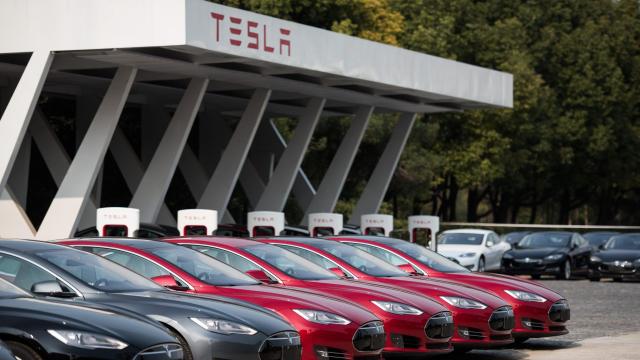In possibly the biggest blow to Tesla’s Full Self-Driving beta rollout yet (and there have been several), the company has been forced to issue a recall affecting over 11,700 vehicles equipped with the software.
Tesla opted to uninstall FSD 10.3 across a suite of Model S, X, 3, and Y vehicles following reports of software communication errors (glitches) that in some cases could result in “false forward-collision warnings’’ or automatic braking, according to the recall. Though Tesla was not aware of any crashes resulting from the glitches, the recall acknowledges unexpected braking could increase the risk of rear-end collisions. Tesla says it acted quickly to remedy the bugs and issued an over-the-air software update to affected vehicles.
In a statement sent to Gizmodo, an National Highway Traffic Safety Administration spokesperson confirmed Tesla implemented the recall affecting 11,704 vehicles.
“Tesla uninstalled FSD 10.3 after receiving reports of inadvertent activation of the automatic emergency braking system,” the spokesperson said. “Tesla informed NHTSA that it has updated the software and released FSD version 10.3.1 to those vehicles affected. NHTSA will continue its conversations with Tesla to ensure that any safety defect is promptly acknowledged and addressed according to the National Traffic and Motor Vehicle Safety Act.”
News of the recall comes less than a month after the NHTSA issued a letter to Tesla where it asked the company why it had decided against issuing a recall despite issuing an FSD fix through another over-the-air update.
“Any manufacturer issuing an over-the-air update that mitigates a defect that poses an unreasonable risk to motor vehicle safety is required to timely file an accompanying recall notice to NHTSA,” the agency wrote at the time.
This marks Tesla’s most significant US recall related to driver assistance features in the United States so far. But regulators in other parts of the world have been more hands-on. Earlier this year, China’s State Administration for Market Regulation recalled nearly 300,000 vehicles over safety issues related to its cruise control feature. In that case, regulators determined the cruise control feature in some Model 3 sedans and Model Y compact crossover vehicles could be activated by accident, resulting in the vehicles appearing to inexplicably speed up.
Though Tesla claims its software update fixed the bugs plaguing its $US10,000 ($13,272) FSD package, the hiccup adds to the mounting cloud of safety concerns involving FSD.
Back in July, Consumer Reports warned FSD lacked adequate safeguards and led to “vehicles missing turns, scraping against bushes, and heading toward parked cars.” Those alleged safety lapses pose potential dangers not just for FSD drivers, but for pedestrians, cyclists, and other motorists as well who never consented to drive alongside a glitchy, semi-autonomous 2,041 kg hunk of aluminium with a propensity for bursting in flames.
Tesla’s leadership hasn’t helped its cause either. Ahead of FSD’s beta expansion earlier this year, CEO Elon Musk published a Tweet telling drivers to, “please be paranoid,” acknowledging that the FSD beta will bring “unknown issues.”
Running preproduction software is both work & fun. Beta list was in stasis, as we had many known issues to fix.
Beta 9 addresses most known issues, but there will be unknown issues, so please be paranoid.
Safety is always top priority at Tesla.
— Elon Musk (@elonmusk) July 9, 2021
All of this fans the flames of concerns from drivers, both of Tesla’s FSD and self-driving systems generally. According to a 2020 J.D. Power survey, 31% of auto industry experts cited gaining consumer trust and acceptance as leading challenges to adopting self-driving vehicles. In that same survey, 69% of U.S. consumers noted technology failures as their primary concern around self-driving features.
Editor’s Note: Release dates within this article are based in the U.S., but will be updated with local Australian dates as soon as we know more.
